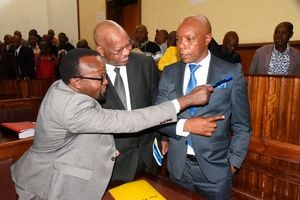Soldiers who died in first, second world wars feted

Thomas Wambai (right) and Joseph Kalului lay wreaths at the Commonwealth War Graves on Ngong Road in Nairobi on November 8, 2020.
What you need to know:
- The Second World War is recorded as one of the bloodiest conflicts in human history.
- As a British colony, Kenya was amongst the troop-contributing countries in East Africa with Nairobi playing home to several hospitals.
Thomas Wambai is not sure of his exact age but, from what his parents told him, he was born in 1922 slightly after the end of the First World War.

KDF soldiers at the Commonwealth War Graves on Ngong Road in Nairobi on November 8, 2020.
He is amongst the few surviving pre-independence members of the Royal Army Medical Corps; a specialist outfit in the British Army, which provides medical services to all army personnel and their families especially during war but also in times of peace.
Despite his old age and failing hearing, Wambai recalls the major milestones he achieved between 1952-1955 when he served at the corps. He assisted soldiers in the Second World War in East Africa and in the Burma campaign both of which earned him four medals of honour including two from the Queen of England and her father.

A KDF soldier prays during the event at the Commonwealth War Graves on Ngong Road in Nairobi on November 8, 2020.
Mr Wambai was among the veterans attending an event to recognise the contribution of Commonwealth military and civilian servicemen and women in the two World Wars and later conflicts at the Commonwealth War Graves on Ngong Road yesterday.
Though he survived the wars, Wambai still harbours the sadness brought by the death of some of the soldiers he worked alongside: “I do understand that in the army death is always a likely eventuality but it’s always sad to lose someone.”
Bloodiest conflicts
The Second World War is recorded as one of the bloodiest conflicts in human history. As a British colony, Kenya was amongst the troop-contributing countries in East Africa with Nairobi playing home to several hospitals.
The Commonwealth War Graves cemetery was used to bury those who died from all over the world in 1941 and was expanded to accommodate more over the years. To date, it ranks as the largest war cemetery in the country with close to 2,000 war graves and two memorials bearing the names of another 2,600 people who died in the Second World War. Lawrence Mwalili, a retired Warrant Officer II who served in the Kenya Army for 37 years and 136 days, said: “I feel sad that some died as young as in their early twenties but I celebrate what they did,” said Mwalili.
The one-hour event was marked by a brief service,prayer session, salutations and laying of wreaths.

Fatuma Anyanzwa(right), Siyama Ismail (centre) and Hanim Anyanzwa who were representing Nubians lay a wreath at the Commonwealth War Graves cemetery on Ngong Road in Nairobi on November 8, 2020.
“They shall grow old not old, as we that are left grow old. Age shall not weary them, nor the years condemn. At the going down of the sun and in the morning, we will remember the,” British Defence Adviser, Brigadier Mark Thornhill said as he recited a poem to remember them.
The event was also attended by the Deputy British High Commissioner, US Ambassador Kyle McCarter and other high ranking members of various diplomatic missions.





